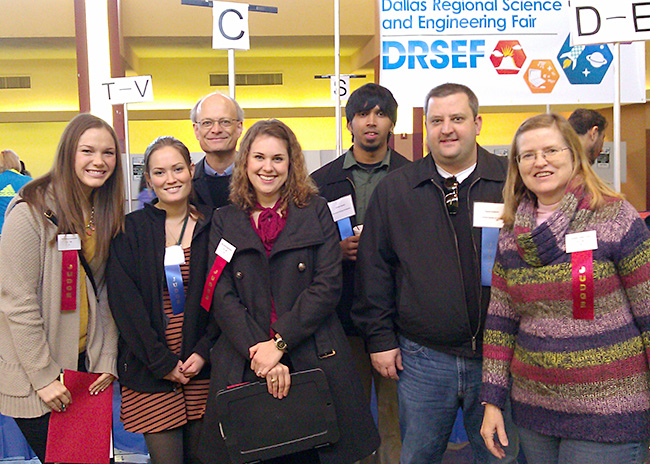UT Dallas Contributes Expertise to Regional Science Fair
By: Office of Media Relations | April 1, 2013

UT Dallas student volunteers and professors recently helped judge the Dallas Regional Science Fair. From left: Kathryn Kuykendahl, Sophie Assmann, Dr. Peter Assmann, Rachel Higginbotham, Shaikat Hossain, Daniel Hubbard and Dr. Jackie Clark.
A group of UT Dallas students and faculty members shared their love of science with the next generation of investigators during the annual Dallas Regional Science Fair.
The team of volunteer judges, led by UT Dallas School of Behavioral and Brain Sciences’ Dr. Jackie Clark and Dr. Peter Assmann, spent a day at the Fair Park event, offering their opinions and encouragement. They were joined by seven BBS students, who also helped judge entries and offered ideas for moving the young people’s research forward.
“The best part of being a judge was talking to the students who are the future of this community and of America,” said audiology graduate student Rachel Higginbotham. “I was beyond impressed with their efforts and passion.”
Most of the judges were given 10 entries to review, which were among hundreds submitted by middle school and high school students from throughout the Dallas area. The judges reviewed each project on the merits of how well the scientific method was followed, as well as creativity and contribution to scientific knowledge.
“The fair is a great avenue to encourage young people’s intellectual curiosity and point it toward research,” said Clark, who has helped evaluate entries during past fairs. “Judges need to provide positive feedback so that students are encouraged to return next year or pursue college.”
“The fair is a great avenue to encourage young people’s intellectual curiosity and point it toward research. Judges need to provide positive feedback so that students are encouraged to return next year or pursue college.”
Dr. Jackie Clark,
clinical associate professor in BBS
The BBS graduate students who helped judge entries were: Katharine Fitzharris, Kathryn Kuykendall, Anum Khan, Sophie Assmann, Daniel Hubbard, Shaikat Hossain and Higginbotham.
Khan is pursuing a doctorate at the Callier Center for Communication Disorders.
“It was my first time attending this event, and I felt that this was a wonderful opportunity to see senior high school and junior high school students participate in a healthy competition,” Khan said.
Clark said the science fair is a rare chance to reach out to school-age children and inspire creative thought regarding science.
“I always find such hope in the future of our youth when I volunteer at the science fair,” Clark said. “Some of these young competitors come from nurturing environments where intelligence is applauded, but there are also some who are not exposed to intellectual pursuit. Just making it to the regional level for the science fair is an accomplishment, and I always point that out to the competitors.”
Higginbotham said the most impressive entry she saw came from a high school student who tested the effects on performing tasks while distracted. The girl compared her findings to the dangers posed by distracted driving.
“I was impressed by the student’s enthusiasm and research methods and hope she continues to question and find answers,” Higginbotham said.
The students who won at the regional level in February moved on to the state competition in San Antonio. Students who win at the state level often receive full scholarships to state universities. After the state competition, winners proceed to the Intel International Science Fair in May.
Media Contact: The Office of Communications and Marketing, or the Office of Media Relations, UT Dallas, (972) 883-2155, newscenter@utdallas.edu.





